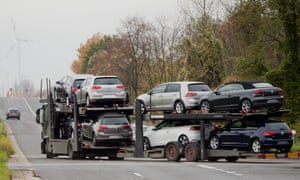VW says it will cover extra CO2 and fuel usage taxes paid by EU drivers
Chief executive Matthias Müller asks ministers to charge carmaker for taxes incurred after admitting understatement affecting 800,000 vehicles
 i.guim.co.uk/img/media/2725fd00ef395b91de577d5587f0bc04096093ab/723_114_3699_2219/master/3699.jpg?w=700&q=85&auto=format&sharp=10&s=fa9eeda09e40d9c654195e2b68c7d77b 700w, i.guim.co.uk/img/media/2725fd00ef395b91de577d5587f0bc04096093ab/723_114_3699_2219/master/3699.jpg?w=645&q=85&auto=format&sharp=10&s=b6c777912cdd5388a60121d7386a8327 645w, i.guim.co.uk/img/media/2725fd00ef395b91de577d5587f0bc04096093ab/723_114_3699_2219/master/3699.jpg?w=465&q=85&auto=format&sharp=10&s=5022ac4da34e75ac8874d04eb11998c7 465w" alt="New Volkswagen cars are transported on a lorry" />
i.guim.co.uk/img/media/2725fd00ef395b91de577d5587f0bc04096093ab/723_114_3699_2219/master/3699.jpg?w=700&q=85&auto=format&sharp=10&s=fa9eeda09e40d9c654195e2b68c7d77b 700w, i.guim.co.uk/img/media/2725fd00ef395b91de577d5587f0bc04096093ab/723_114_3699_2219/master/3699.jpg?w=645&q=85&auto=format&sharp=10&s=b6c777912cdd5388a60121d7386a8327 645w, i.guim.co.uk/img/media/2725fd00ef395b91de577d5587f0bc04096093ab/723_114_3699_2219/master/3699.jpg?w=465&q=85&auto=format&sharp=10&s=5022ac4da34e75ac8874d04eb11998c7 465w" alt="New Volkswagen cars are transported on a lorry" />Volkswagen has said it will foot the bill for extra taxes incurred by drivers after it admitted understating the carbon dioxide emissions of about 800,000 cars inEurope.
In a letter to European Union finance ministers on Friday, seen by Reuters, Matthias Müller, the VW chief executive, asked member states to charge the carmaker rather than motorists for any additional taxes relating to fuel usage or CO2 emissions.
The initial emissions scandal, which erupted in September when Volkswagen admitted it had rigged US diesel emissions tests, affecting 11m vehicles globally, deepened this week when VW said it had also understated the carbon dioxide emissions and fuel consumption of 800,000 vehicles in Europe.
Analysts say VW, Europe’s biggest carmaker, could face a bill of up to €35bn (£25bn) for fines, lawsuits and vehicle refits. To help meet some of the anticipated costs, VW has announced a €1bn programme of spending cuts.
The head of VW’s works council said the announcement of the cuts had broken strict rules in Germany on consultation with workers and demanded immediate talks with company bosses.
“Management is announcing savings measures unilaterally and without any foundation,” Bernd Osterloh said in an emailed statement.
VW also confirmed on Friday that a third senior executive was leaving the company, following the departure of the former chief executive and the manager who had been designated to run VW’s North American business.
The company said Walter Maria de Silva, the design chief responsible for models including the Golf Mk7 and Audi A5, would retire at the end of November. It did not name a successor.
The German business daily Handelsblatt, citing company sources, had earlier said VW planned to cut costs in de Silva’s department, which spends about €100m a year. VW did not comment on the report.
Since the emissions revelations, VW has been criticised by lawmakers, regulators, investors and customers frustrated at the time it is taking to get to the bottom of a scandal that has wiped almost a third off the carmaker’s market value.
Mary Nichols, the head of the California Air Resources Board, which is investigating VW in the US, told the German magazine WirtschaftsWoche: “Volkswagen is so far not handling the scandal correctly.
“Every additional gram of nitrogen oxide increases the health risks for our citizens. Volkswagen has not acknowledged that in any way or made any effort to really solve the problem.”
The case is “the biggest direct breach of laws that I have ever uncovered ... This is a serious issue, which will certainly lead to very high penalties,” Nichols added.
The scandal has also piled pressure on European regulators, who have long been criticised by environmentalists on the grounds that on-road tests have consistently shown vehicles emitting more pollutants than official laboratory tests.
In an open letter, a group of leading investors urged the EU to toughen up vehicle testing.
But it faces a battle because carmakers have traditionally had a strong influence on policy in countries such as Germany, Europe’s biggest economy, where they are an important source of jobs and export income.
The European commission sent a letter to all 28 EU member states on Thursday urging them to widen their investigations into potential breaches of vehicle emissions regulations.
Vehicle testing in the EU is overseen by national authorities, so the commission is reliant on each country to enforce the rules. A commission spokeswoman said: “Public trust is at stake. We need all the facts on the table and rigorous enforcement of existing legislation.”



